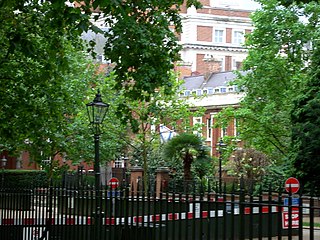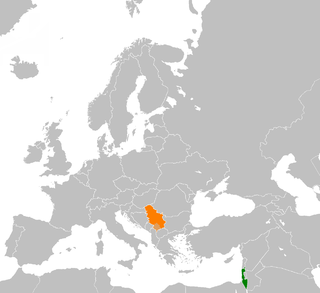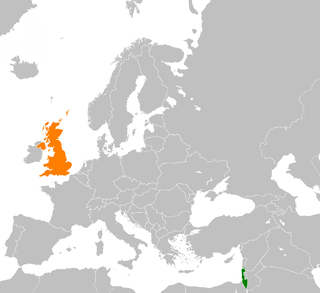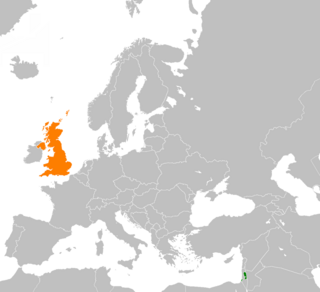
Jeremy Bernard Corbyn is a British politician who served as Leader of the Opposition and Leader of the Labour Party from 2015 to 2020. On the political left of the Labour Party, Corbyn describes himself as a socialist. He has been Member of Parliament (MP) for Islington North since 1983. As of October 2020, Corbyn sits in the House of Commons as an independent, following the suspension of the whip.

Michael John Gapes is a British former politician who served as Member of Parliament (MP) for Ilford South from 1992 to 2019.

The 1994 London Israeli Embassy bombing was a car bomb attack on 26 July 1994 against the Israeli embassy building in London, England. Twenty civilians were injured. A second bomb was exploded outside Balfour House, Finchley, premises occupied by the UJIA, a registered British charity.

Israel–New Zealand relations are the foreign relations between the State of Israel and New Zealand. While Israel has an embassy in Wellington, New Zealand's embassy in Ankara, Turkey is accredited to Israel. Diplomatic relations between the two countries date back to January 1949. New Zealand has exported a mixture of agricultural and manufactured goods to Israel. In return, Israel has exported a range of manufactured goods to New Zealand. Bilateral relations between the two countries have been complicated by issues such as the 2004 Israel–New Zealand passport scandal, United Nations Security Council Resolution 2334, and the Israel-Palestine conflict.

The diplomatic relations between Israel and Serbia were established on January 31, 1992, when Serbia was part of FR Yugoslavia. Israel has an embassy in Belgrade and Serbia had an embassy in Tel Aviv. Yugoslavia was the second country in Europe to recognize Israel in 1948. The two countries have economic and cultural ties, helped by a sizable community of Jews from the former Yugoslavia in Israel. Serbia agreed to move its embassy to Jerusalem on 4 September 2020 but decided not to after Israeli recognition of Kosovo as a sovereign state.

Israel–United Kingdom relations, or Anglo-Israeli relations, are the diplomatic and commercial ties between the United Kingdom and Israel. The British embassy to Israel is located in Tel Aviv. The UK has an honorary consul in Eilat and a non-accredited consulate-general in Jerusalem, that represents the United Kingdom in that city and the Palestinian territories. Israel has three representative offices in the United Kingdom: an Embassy located in London and consulates in Cardiff and Glasgow.
Manuel Sarkis Hassassian is a Palestinian- Armenian professor, who from late 2005 to October 2018 was the Palestinian Authority's diplomatic representative to the United Kingdom, after being appointed to the position by Palestinian Authority President Mahmoud Abbas.
The Jewish Labour Movement (JLM), known as Poale Zion (Great Britain) from 1903 to 2004, is one of the oldest socialist societies affiliated to the UK Labour Party. It is a member of the progressive coalition of Avodah/Meretz/Arzenu/Ameinu within the World Zionist Organization. Its sister parties are the Israeli Labor Party (Havodah) and Meretz.

According to the British government, the United Kingdom of Great Britain and Northern Ireland and the Kingdom of Saudi Arabia have long been close allies. Relations between the two countries date back to 1848, when Faisal bin Turki, ruler of the Second Saudi state, formally requested the support of the British Political Resident in Bushire for his representative in Trucial Oman.

The United Kingdom does not recognise Palestine as a state. The UK has a non-accredited Consulate General in Jerusalem that "represents the UK government in Jerusalem, West Bank, and Gaza", and works on "political, commercial, security and economic interests between the UK and the Palestinian territories". Husam Zomlot became head of the Palestine Mission to the United Kingdom in 2018. The State of Palestine was represented in London by Manuel Hassassian, the Palestinian General Delegate to the United Kingdom between 2005 and 2018. Another former Palestinian General Delegate to the UK was Afif Safieh, who began in that role in 1990.

Yaakov Heruti was an Israeli lawyer, right wing activist and Zionist militiant. He was a member of the pre-state militant group Lehi, during which he built bombs for the organization and in particular, assembled the letter bomb that was sent to Roy Farran while stationed in Britain as an undercover agent. He later became the leader of the group Kingdom of Israel, which bombed the Soviet embassy in Tel Aviv and carried out other acts of terrorism in the 1950s, for which he served a two-year prison term. He later became involved in politics and settlement activity, participating in the founding of two right-wing political parties and assisting settlers in purchasing land.

The Stop the War Coalition (StWC), informally known simply as Stop the War, is a British group that campaigns against the United Kingdom's involvement in military conflicts.

The Middle East Monitor (MEMO) is a not-for-profit press monitoring organisation and lobbying group that emerged in mid 2009. MEMO is largely focused on the Israeli–Palestinian conflict, but writes about other issues in the Middle East as well. MEMO is pro-Palestinian in orientation and supports Islamist causes. MEMO is regarded as an outlet for the Muslim Brotherhood and its website strongly promotes pro-Hamas related content.
This article summarises the views and voting record of Labour Party MP Jeremy Corbyn, who was the Leader of the Opposition and Leader of the Labour Party in the United Kingdom from 12 September 2015 until 4 April 2020.
On 21 January 2017, a bomb was detonated at a vegetable market in Parachinar, in the Kurram Valley of the Federally Administered Tribal Areas of Pakistan. At least 25 people were killed and 87 injured by the explosion. Parachinar is the administrative headquarters of the Kurram Agency near the Afghan border. The same area has previously seen several blasts in 2008, February 2012, September 2012, 2013 and in December 2015.
There have been instances of antisemitism within the Labour Party of the United Kingdom (UK) since its establishment. Notable occurrences include canards about "Jewish finance" during the Boer War and antisemitic remarks from leading Labour politician Ernest Bevin. In the 2000s, controversies arose over comments made by Labour politicians regarding an alleged "Jewish lobby", a comparison by London Labour politician Ken Livingstone of a Jewish journalist to a concentration camp guard, and a 2005 Labour attack on Jewish Conservative Party politician Michael Howard.

Jewish Voice for Labour (JVL) is a British organisation formed in 2017 for Jewish members of the Labour Party. Its aims include a commitment "to strengthen the party in its opposition to all forms of racism, including anti-Semitism ... to uphold the right of supporters of justice for Palestinians to engage in solidarity activities", and "to oppose attempts to widen the definition of antisemitism beyond its meaning of hostility towards, or discrimination against, Jews as Jews".
The Corbyn wreath-laying controversy refers to a political controversy in the United Kingdom surrounding the visit of Jeremy Corbyn to the Hamman Chott Cemetery in Tunis in 2014.

In the morning of January 27, 2019, two bombs exploded at the Roman Catholic Cathedral of Our Lady of Mount Carmel in Jolo, Sulu, Philippines. Twenty people were killed and 102 others injured. The bombings took place a week after the autonomy plebiscite held on January 21 for the creation of Bangsamoro. It is believed that the Abu Sayyaf carried out the attacks, and the Islamic State claimed responsibility. President Rodrigo Duterte responded by issuing an "all-out war" directive against the Abu Sayyaf. The bombings were widely condemned by other countries and organizations.













